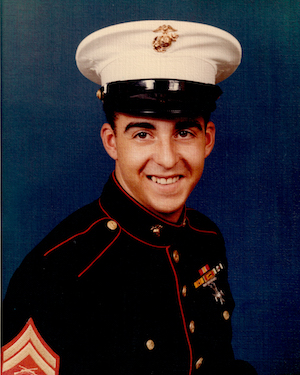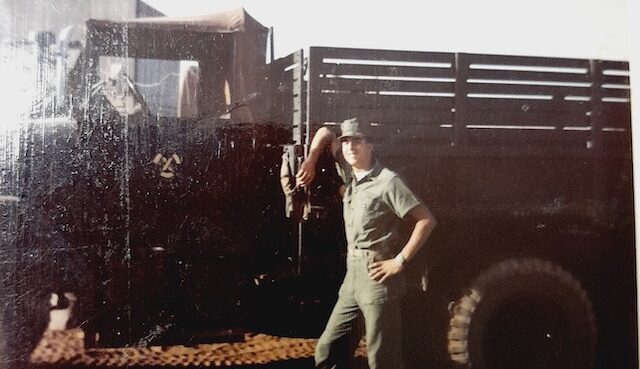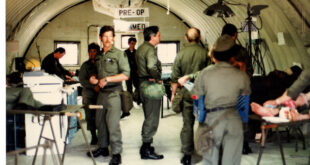Assigned to a motor transport unit in Vietnam, Michael Pawelek drove a variety of vehicles while tackling other duties such as working the switchboard, manning bunkers on night duty and setting up ambush sites.
Michael Pawelek was born in Chicago to Edward and Marie Sartor Pawelek. The family lived in an apartment behind Edward’s barbershop on the South Side until moving to Park Ridge when Pawelek was 5 years old.
His maternal grandparents emigrated from a town near Venice, Italy, settling in Eveleth, Minnesota, and his paternal grandparents from the area around Warsaw, Poland, settling in Summit, Illinois. “In the summertime, I would go to Minnesota for four or five weeks,” Pawelek says.
An only child and grandchild, Pawelek enjoyed the attention and delicious food. “My grandmother used to make raviolis by hand and gnocchi,” he says. “My mother always cooked Italian food, mostaccioli and meatballs, lasagna … ”
Pawelek attended Park Ridge Military Academy through third grade, after which the family moved to Des Plaines. He graduated from Our Lady of Hope Grade School and Maine West High School.
After high school, Pawelek worked three jobs, apprenticing at a local pharmacy, manning the pumps at a gas station and repairing cash registers. “I didn’t know what I wanted to do, didn’t want to go to college,” Pawelek says. “But I just wanted to get away from home and be on my own a little bit.”
Pawelek decided to join the Marines, but at 17 years old, needed his parents’ permission, which they refused to grant. Both were World War II veterans, with Pawelek’s father fighting with the Navy in the South Pacific and his mother serving in the Women’s Army Corps and caring for amputees at Walter Reed Hospital. Neither wanted their only child to join. “I said if you don’t sign now, I’ll just wait a month and go in myself,” Pawelek says.
 His father relented and Pawelek was sworn into the Marine Corps on Dec. 18, 1968. He graduated from boot camp at MCRD San Diego, and received orders for Vietnam. “I knew there was a war and guys were going to Nam,” Pawelek says. “Other than that, I didn’t know anything about what it was about.”
His father relented and Pawelek was sworn into the Marine Corps on Dec. 18, 1968. He graduated from boot camp at MCRD San Diego, and received orders for Vietnam. “I knew there was a war and guys were going to Nam,” Pawelek says. “Other than that, I didn’t know anything about what it was about.”
Pawelek completed infantry training at Camp Pendleton, California, and trained as a motor transport operator. Next came two weeks of rigorous tactical movements specifically for Vietnam. “How to clear a village or how to set up a machine-gun nest or what to carry on patrol,” he explains.
Pawelek deployed overseas, stopping in Okinawa, Japan, and then Da Nang, Vietnam. He was stationed at Phu Bai Marine base with the Motor Transport Unit, 1st Marine Air Wing. “First Marine Air Wing was an air wing with aircraft and I was the motor transport part of it,” he says.
During his year at Phu Bai, Pawelek rotated between living on the base perimeter and in barracks on the main base. His job and vehicle varied. He drove a jeep, a tactical pickup truck or a heavily armed 2-1/2 ton cargo truck. “Depending on what they needed done, I was the driver for that,” he says.
On the perimeter with the rifle battalion, Pawelek slept in tents fortified with sandbags. He filled and distributed sandbags along the base perimeter and collected and emptied 55-gallon trash barrels into his truck. Trash was brought to nearby Camp Eagle Army base for disposal.
Pawelek also rotated on night-duty shifts and occasionally manned the switchboard. “A base runs seven days a week, never shuts down,” he says. Protecting the base perimeter was crucial. “We would be out there from 7 p.m. till 6 a.m. in different bunkers,” he says.
Patrolling outside the base, Pawelek set up ambush sites. “We’d sit there two, three hours, then go to another ambush sight, sit there another two, three hours,” he says. “What you’re trying to do is catch the Viet Cong on those roads, whether it be moving supplies or rice or food or ammo or anything.”
Night patrols returned at 3 or 4 a.m., popping a green flare to show the perimeter guards that “friendlies” were coming in. “You had to be at a specific area at a specific time,” Pawelek says. “If you weren’t at the right area at the right time, they’d shoot you, pure and simple.”
Pawelek drove the “deuce and a half” in a convoy of six to eight vehicles outside base. Along with patrolling, duties included driving officers to and from Camp Eagle for paperwork and meetings, and picking up supplies in Da Nang. “You always carried your rifle wherever you went, you never put it down,” Pawelek says, “because we were in a zone where you could get hit anytime, anyplace.”
After finishing up at Camp Eagle, Pawelek and his buddies bought chewing gum at the PX before heading back. Local children lined the road looking for handouts, anything to eat and the Marines threw gum to them. “One of the little things we used to do,” says Pawelek. “You don’t realize how primitive the living out there was.”
Pawelek drove to the local orphanage every Sunday, picked up the children and brought them to the base. “We would show them a good time — food, games — and then put them back in the truck and take them back to the orphanage,” Pawelek says.
Pawelek’s convoy once drove through tear gas and thwarted an enemy attack. “They drill it in your head that everyplace you’re at is a combat zone because you’re dealing with a guerilla warfare. They could do anything, anytime to you.” This warning pertained to roadside vendors, too. Food and drinks were often tainted with crushed glass and small pieces of bamboo. “So you’re leery of everything you touch, everyplace you step, everyplace you go,” says Pawelek.
His Vietnam tour over, Pawelek was stationed with MAG-36 at MCAS Futenma Airfield in Okinawa before returning to California in September 1970. He was stationed at El Toro with the 3rd Marine Air Wing as a driver for officers, taking them wherever they wanted to go. “It’s not a bad duty,” Pawelek says.
He completed three years active duty as Corporal and, while fulfilling his three-year reserves obligation, attended California State University under the GI Bill, earning an associate’s degree in engineering in 1974.
Pawelek returned to Chicago, where he worked as a mechanical designer and remained in the Marine Reserves with VMGR 234, stationed in Glenview. He flew on KC-130 Hercules Refuelers supporting war games. “Our mission was to refuel planes so they wouldn’t have to go back to base and they could continue on with their missions of training,” he says.
Pawelek left the reserves in 1982 as Staff Sergeant. He and his wife, Helene (Golstein), have two children. He retired as a senior process engineer at Se-Kure Controls, holding two patents.
Reflecting on the controversy surrounding the Vietnam War and the animosity toward returning military personnel, he says, “The poor people, you don’t see the people, you weren’t there. You don’t see the people that were under communism … what they had to go through!”
The article above appears in the January 2025 issue of the print version of Fra Noi. Our gorgeous, monthly magazine contains a veritable feast of news and views, profiles and features, entertainment and culture. To subscribe, click here.
 Fra Noi Embrace Your Inner Italian
Fra Noi Embrace Your Inner Italian







